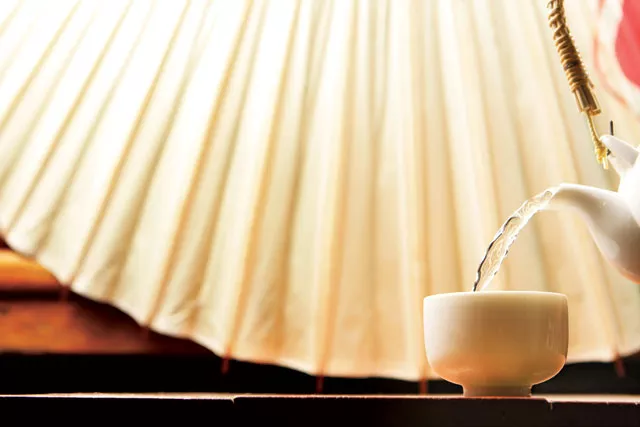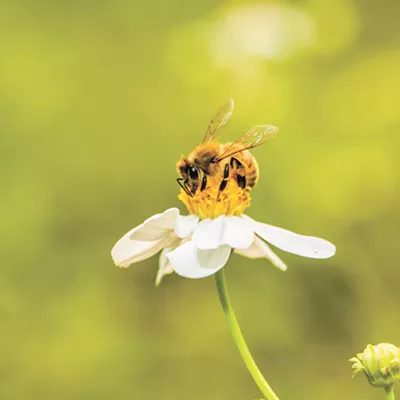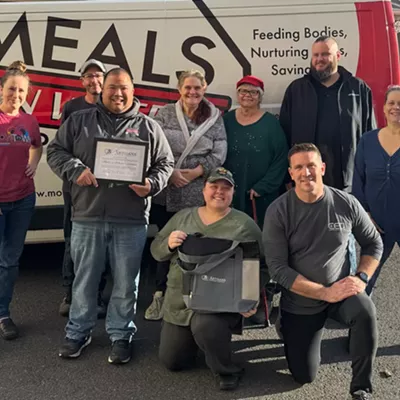Spokane has a lot of things worth bragging about. There’s Riverfront Park. There’s Bloomsday. There’s Hoopfest. And according to Mike LaScuola, environmental health specialist for the Spokane Regional Health District, there’s the water that’s streaming out of your kitchen faucet.
In February of last year, the city of Spokane even launched a campaign to promote its tap water. Tap water wagons began showing up to community events, to hand out free water and free information.
“It’s safe, and it’s aesthetically pleasing,” LaScuola says. “As long as we protect it.”
In fact, Marshall Thompson of the city’s water department says, the taste of Spokane water repeatedly sends it to the top rankings of regional water taste tests.
“Our water is pretty much water,” LaScuola says. “It’s got what I consider a fairly decent natural balance of minerals in it to give it that good flavor.”
The pH level is practically neutral — just a bit alkaline, or basic. Sure, it has a bit of calcium carbonate — makes it tough for phosphate-free dishwasher detergent to get off the film — but that poses no health risk.
And our water isn’t chemically filtered. It doesn’t have to be. There’s a small squirt of chlorine — just in case —but other than that, the Spokane-Rathdrum Prairie aquifer, with tightly packed gravel, is all the filtration it needs.
Of course, it doesn’t hurt for the city to be extra cautious. “We have a very aggressive water sampling schedule that tests for everything under the sun,” Thompson says. If there’s a big scare in the national media, you can bet they’ll test the city water for it.
But what about the other alternatives to city water? Here are the advantages and disadvantages of well water, water filters and bottled water:
Oh, Well
A good private well taps the same Spokane-Rathdrum Prairie aquifer that provides Spokane’s city water, so well water should be just as safe as tap water, provided that the well is soundly constructed. However, LaScuola warns, test it often. With your well, you have to set your own aggressive water inspection schedule.
And if your well water starts coming out more thick than usual, maybe it’s time to call the inspector.
Through the Filter
There’s a reason that water from the Brita filtered container in the fridge tastes better. But it’s not the filtration system.
“It’s cold,” Thompson says. “Forty-degree water tastes better.”
While carbon filters can eliminate trace amounts of chlorine, a filter attached to a Spokane faucet won’t have much to filter.
In fact, LaScuala says, filters can be dangerous if not changed out on a regular basis. The small amount of contaminants trapped can build up to a large amount. If the filter isn’t changed, it could break, releasing those contaminants in a sudden whoosh.
Bottle Shock
“Our naturally occurring water is as good a quality as any bottled water,” LaScuola says. So, unless you’re at the Interstate Fair without quick access to tap water, why shell out the cash?
In some cases, tap water may actually be safer than bottled water. Tap water falls before the strict scrutiny of the Environmental Protection Agency. Bottled water, however, is only regulated by the Food and Drug Administration, and only lightly.
According to the nonprofit advocacy organization Environmental Working Group, fewer than 2 percent of the 200 most popular bottled water brands disclosed the water’s source, purification methods and chemical pollutants.
Then there’s the environmental issue: The Earth Policy Institute figures that, with 8 billion gallons of bottle water consumed annually, it takes 1.5 billion gallons of oil yearly — enough to fuel 100,000 cars for a year— to make the plastic.
Finally, an item the frugal and the eco-friendly can agree to despise.
Drink Responsibly
Of course, all that delicious aquifer water is ultimately limited. Eventually, the Spokane region could begin to use it faster than it can refill.
That, to put it lightly, would be a bad thing. For that reason, the city has tried repeatedly to convince its citizens to use less water. There are the classics, of course: low-flow showerheads, shorter showers and low-flow (but single-flush) toilets.
The easiest place to cut back on water usage, says Spokane water official Marshall Thompson, is on the lawn. In the summer, when sprinklers begin spinning, water usage skyrockets. Try adjusting your watering times, Thompson suggests. Watering in the heat of the day is not only ineffective, but the evaporation can actually burn up your lawn. Thompson recommends equipping sprinklers with a 30-minute shutoff switch.
Of course, there’s another key suggestion: “Try to have less lawn,” Thompson jokes. “That’s always a good one.”





















